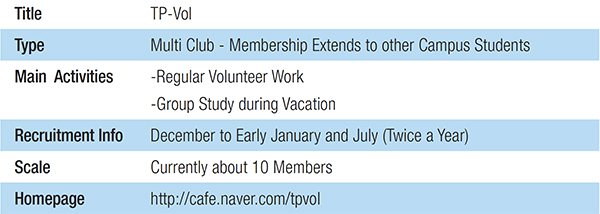
Have you ever seen the movie Avatar? Avatars touch and connect with others through their tenticles. By doing so, they share their feelings and even cure one another. In this way, physical contact is a great power that can help people relate to one another. Like avatars, there are students curing others by volunteering in the club Play Therapy, which is based on empathy and contact. The Sookmyung Times met Kim Sujung, representative of TP-Vol, to learn about this type of volunteer work.


Please share the origin of the name TP-Vol and introduce the club’s main activities.
TP-Vol is a coined term from the words ‘Theraplay-oriented’ and ‘Volunteer,’ and it summarizes the nature of the club. In the beginning, Professor Kim Yoonkyung, an expert in Play Therapy and also professor of Division of Child Welfare & Studies at Sookmyung Women’s University, held the main role of club and students acted in supporting roles. However, the club is now completely student operated without the assistance of an expert, so we use a name originating from Play Therapy. Volunteers utilize Play Therapy theories and programs previous established by the founding professor. We volunteer at Senior Citizen Centers and Children Centers in Mapo-gu. At Children Centers, we engage in dynamic activities to stimulate the motivation of children like organizing teams for play. However, in the case of Senior Citizen Centers, we are a bit more static than Children Centers.
Play Therapy is not well-known among people. How do club members learn and gain knowledge about treatment programs in order to do the volunteering?
Most volunteer club members are also unfamiliar with Play Therapy, so we set up study groups to learn about the meaning behind our club activities. The study includes the effect and purpose of Play Therapy by focusing on four components: Structure, Challenge, Intrusion, and Nurture. In addition, related majors are introduced in more detail, and we sometimes have pop quizzes that check whether we understand Play Therapy well or not. These quizzes are taken periodically and actively completed by members. Moreover, Professor Kim Yoonkyung visits the club several times a semester to describe the theoretical background of Play Therapy and discuss precautions relating to volunteering work. At that time, we ask questions and obtain answers about Play Therapy. Also, after each volunteering activity, all members gather to discuss the strengths and weaknesses of the day in order to improve.

What do you achieve by doing volunteering work and would you please tell our readers about any moment that remains clear in your memory?
The feeling that every activity benefits others makes us proud. Engaging in program activities, we usually chat affectionately, and I feel closer by communicating intimately together. At the onset of activities with the elderly, they don’t want to express themselves with words, but eventually, they slowly open their minds during Play Therapy. Love for others is worthwhile. The belief in myself is another benefit of this type of volunteering. While activities are carrying on, we sometimes face a moment that does not progress as expected, but we challenge that hardship and overcome the difficulty. It is at that moment, I feel all club members mature.



